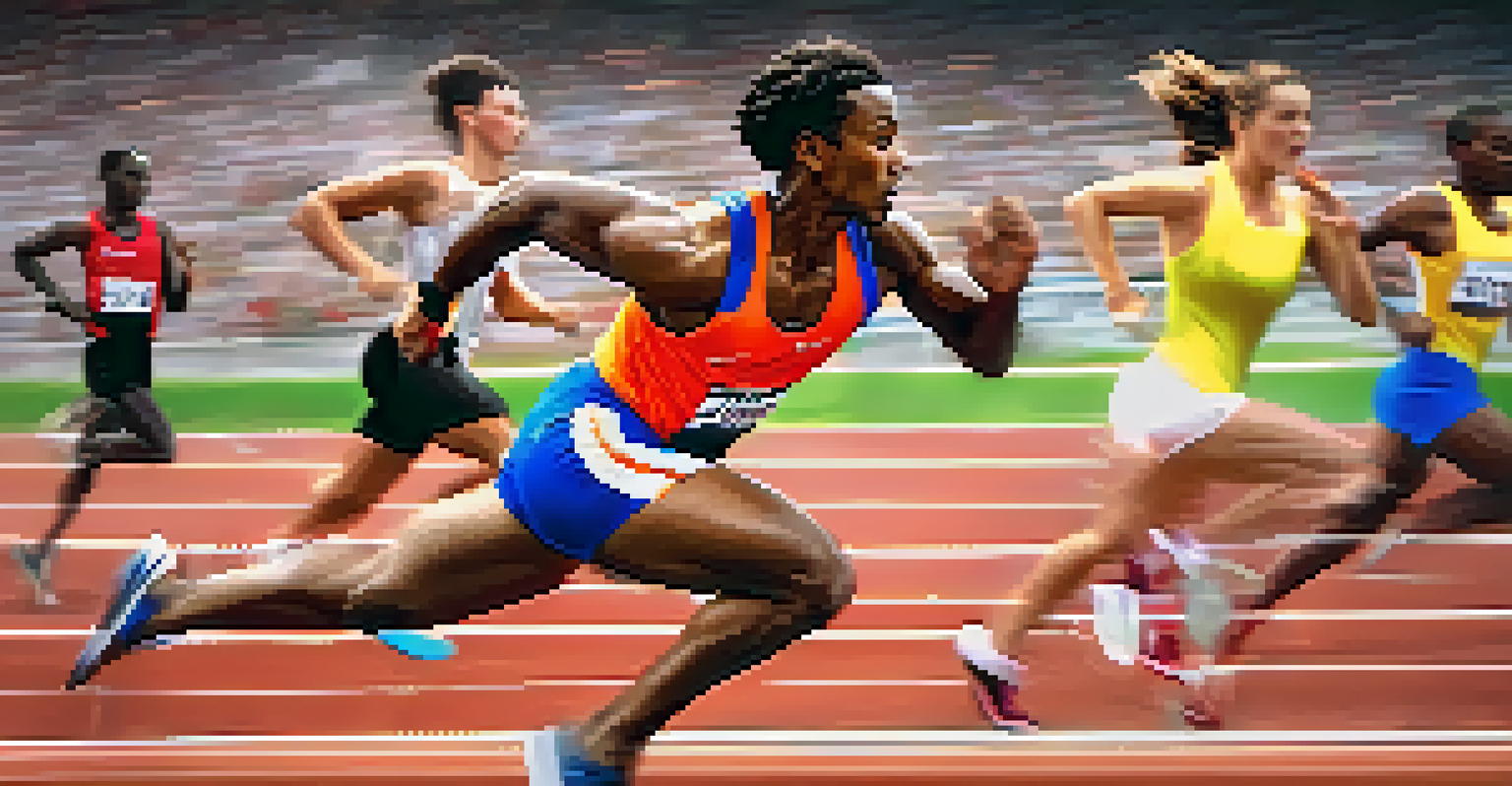Creating Nutrition Plans for Optimal Athletic Performance

Understanding the Role of Nutrition in Athletic Performance
Nutrition is the foundation of athletic performance, influencing energy levels and recovery. Just as a car needs the right fuel to run efficiently, athletes require proper nutrition to optimize their physical capabilities. A well-balanced diet not only supports training but also enhances overall health, reducing the risk of injury.
You are what you eat, so don't be fast, cheap, easy, or fake.
Athletes must focus on macronutrients—carbohydrates, proteins, and fats—each serving a unique purpose. Carbohydrates are crucial for energy, proteins aid in muscle repair, and healthy fats support hormone production. Understanding how these components work together can help athletes tailor their nutrition for peak performance.
Moreover, hydration is a critical aspect of nutrition that is often overlooked. Dehydration can lead to fatigue and decreased performance, so athletes should prioritize fluid intake before, during, and after exercise. By establishing a solid nutritional foundation, athletes can unlock their full potential.
Identifying Individual Nutritional Needs
Every athlete is unique, which means their nutritional needs can vary widely. Factors such as age, sex, body composition, and the type of sport all influence dietary requirements. For instance, a sprinter may need a different balance of carbs and proteins compared to a long-distance runner.

To create an effective nutrition plan, athletes should start by assessing their individual goals and current dietary habits. This might involve keeping a food diary or consulting with a nutritionist to identify areas for improvement. Personalization is key to ensuring that the nutrition plan aligns with their specific performance objectives.
Nutrition Fuels Athletic Performance
Proper nutrition, including a balance of macronutrients and hydration, is essential for optimizing energy levels and enhancing recovery in athletes.
Additionally, understanding the timing of nutrient intake can make a significant difference. Consuming the right foods before and after workouts can enhance energy levels and recovery. By paying attention to their unique needs, athletes can develop a nutrition strategy that truly supports their performance.
The Importance of Macronutrients in Training
Macronutrients—carbohydrates, proteins, and fats—play a vital role in an athlete's diet. Carbohydrates are the primary source of energy and should make up a significant portion of an athlete's intake. They fuel workouts and replenish glycogen stores in muscles, which is essential for optimal performance.
Nutrition is not just about eating. It's about learning to live.
Proteins are critical for muscle repair and growth, especially after intense training sessions. Athletes should focus on consuming high-quality protein sources, such as lean meats, dairy, and legumes. Incorporating protein-rich snacks post-exercise can help speed up recovery and build strength.
Fats, often misunderstood, are also essential for athletes. Healthy fats, found in foods like avocados and nuts, provide long-lasting energy and support overall health. A balanced intake of all three macronutrients ensures that athletes have the energy and nutrients needed to excel in their sport.
Incorporating Micronutrients for Enhanced Performance
While macronutrients get a lot of attention, micronutrients are equally important for athletes. Vitamins and minerals play crucial roles in energy production, immune function, and recovery. For example, iron is vital for oxygen transport in the body, while calcium supports bone health.
Fruits and vegetables are excellent sources of micronutrients, and athletes should aim to include a colorful variety in their diets. Not only do these foods provide essential vitamins and minerals, but they also offer antioxidants that can help combat oxidative stress from intense training.
Individualized Nutrition Plans Matter
Athletes should assess their unique dietary needs and goals to create personalized nutrition strategies that align with their performance objectives.
It's important for athletes to be mindful of potential deficiencies that can arise from restrictive diets. A well-rounded nutrition plan that includes a range of foods can help ensure that athletes meet their micronutrient needs and perform at their best.
Hydration Strategies for Peak Performance
Staying hydrated is crucial for athletic performance, yet many athletes underestimate its importance. Water helps regulate body temperature, transport nutrients, and prevent fatigue. Even mild dehydration can impair performance, making it essential to drink enough fluids before, during, and after physical activity.
Athletes should tailor their hydration strategies based on the intensity and duration of their workouts. For longer sessions, electrolyte-rich drinks can help replenish lost minerals and maintain hydration levels. Monitoring urine color can be a simple way to gauge hydration status—clear is ideal!
In addition to water and sports drinks, incorporating hydrating foods like fruits and vegetables can also boost fluid intake. By prioritizing hydration, athletes can enhance their performance and support recovery.
Meal Timing: When to Eat for Optimal Performance
Meal timing can significantly impact an athlete's performance and recovery. Consuming the right foods at the right times helps to maximize energy levels and muscle recovery. For instance, having a carbohydrate-rich snack before a workout can enhance performance, while a post-workout meal with protein can aid recovery.
The timing of meals and snacks around training sessions should be strategic. Athletes may benefit from eating a meal 3-4 hours before an event and a small snack 30-60 minutes prior. This approach ensures they have adequate energy without feeling weighed down.
Timing Nutrition Enhances Results
Strategic meal timing, both before and after workouts, can significantly impact energy levels and recovery, leading to improved athletic performance.
Post-exercise nutrition is equally important. Consuming a balanced meal within an hour after training can help replenish glycogen stores and support muscle repair. By mastering meal timing, athletes can optimize their performance and recovery.
Monitoring Progress and Making Adjustments
Creating a nutrition plan is not a one-time effort; it requires ongoing monitoring and adjustments. Athletes should regularly assess their performance and how their bodies respond to their nutrition strategies. Keeping track of energy levels, recovery times, and overall performance can provide valuable insights.
If an athlete is not achieving their desired results, it may be time to reevaluate their nutrition plan. This could involve adjusting macronutrient ratios, meal timing, or even experimenting with new foods. Flexibility is key, as what works for one athlete may not work for another.

Consulting with a sports nutritionist can also be beneficial for ongoing support. They can provide personalized guidance and help athletes stay on track toward their performance goals. By continuously monitoring and adjusting their nutrition plans, athletes can consistently strive for optimal performance.